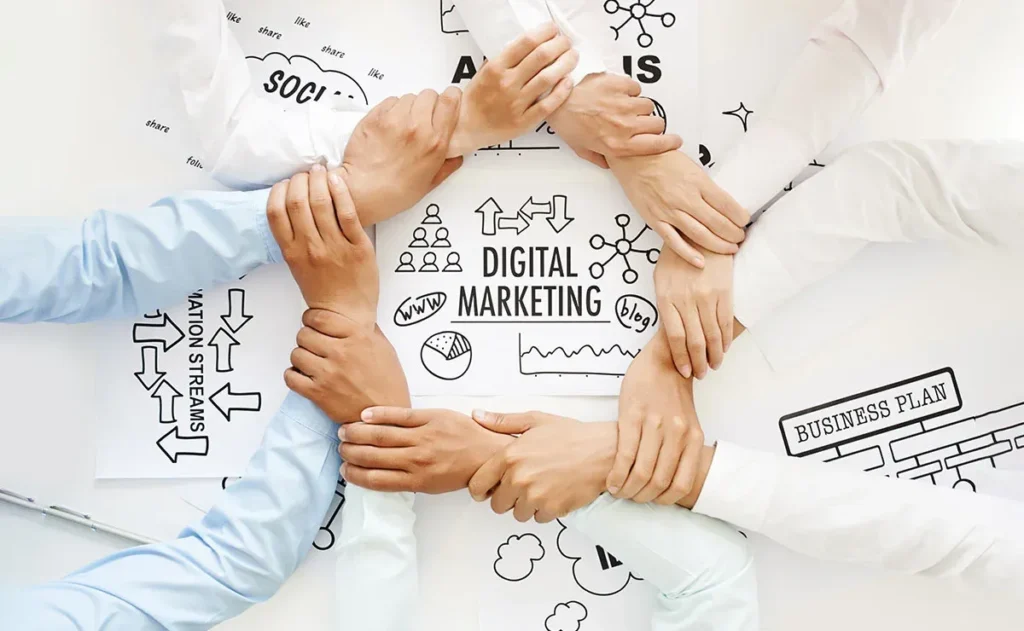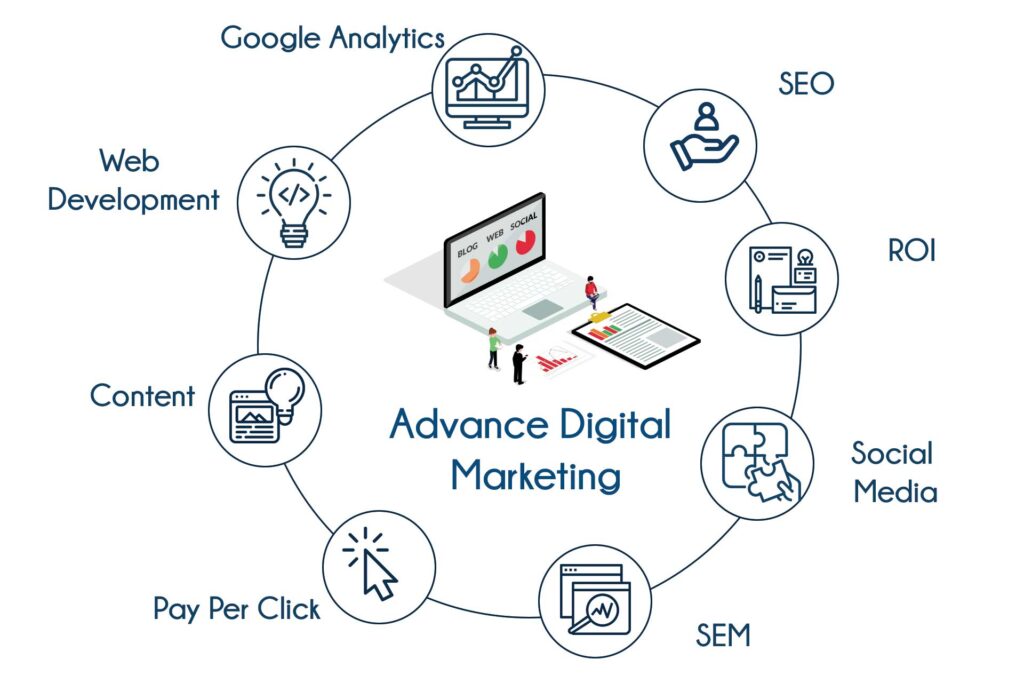In today’s fast-paced online world, Digital Marketing has become a powerful tool for businesses, creators, and bloggers to grow their audience, increase traffic, and boost visibility on search engines. But what exactly is digital marketing Services? And how can it help you rank better in SERP (Search Engine Results Pages)?
Let’s break it down in a simple and effective way.
✅ What is Digital Marketing?
Digital Marketing is the promotion of products, services, or content using online channels like:
- Search engines (Google, Bing)
- Social media (Instagram, Facebook, Twitter)
- Email marketing
- Websites and blogs
- Online ads (Google Ads, Facebook Ads)
- Influencer and affiliate marketing
Unlike traditional marketing (TV, newspapers, radio), digital marketing allows targeted promotion and real-time performance tracking.
Why is Digital Marketing Important?
- 📈 Increases Website Traffic
- 🏷️ Boosts Brand Awareness
- 🎯 Targets the Right Audience
- 💰 Cost-Effective Compared to Offline Marketing
- 📊 Offers Measurable Results
Whether you’re a small blogger or a big business, digital marketing levels the playing field.
How Can Digital Marketing Help in SERP Rankings?
To appear on the first page of Google, you need to impress both users and search engine algorithms. Here’s how digital marketing helps with that:

1. SEO (Search Engine Optimization)
Optimizing your website with the right keywords, quality content, meta tags, and backlinks improves your SERP ranking organically.
SEO (Search Engine Optimization)
- On-Page SEO
- Off-Page SEO
- Technical SEO
- Keyword Research
- SEO Tools
2. Content Marketing
Publishing helpful, engaging blog posts (like this one!) regularly boosts trust and encourages users to stay longer on your site — which helps in SEO.
Content Marketing
- Blogging
- Video Marketing
- Infographics
- Copywriting
- Storytelling
3. Social Media Signals
When your content is shared on social platforms, it increases visibility and indirectly supports higher rankings.
Social Media Marketing (SMM)
- Instagram Marketing
- Facebook Ads
- Twitter/X Strategy
- LinkedIn Growth
- Influencer Marketing
Search Engine Marketing (SEM)
- Google Ads
- Bing Ads
- Paid Search Strategy
- Retargeting Campaigns
4. Email Marketing
Bringing readers back to your site through email campaigns increases traffic and signals to search engines that your content is valuable.
Email Marketing
- Newsletters
- Drip Campaigns
- Lead Nurturing
- Email Design Tips
- List Building
5. Paid Ads (SEM)
Running search engine ads (like Google Ads) can immediately bring you to the top of search results — especially useful for new websites.
Search Engine Marketing (SEM)
- Google Ads
- Bing Ads
- Paid Search Strategy
- Retargeting Campaigns
Advanced digital marketing goes beyond the basics of SEO, social media, and email campaigns. It involves data-driven, AI-powered, and highly targeted strategies to engage users at every touchpoint of the customer journey.
Unlike traditional digital marketing, advanced strategies focus on:
- Personalization at scale
- Automation and AI integration
- Omni-channel presence
- Predictive analytics
- Advanced performance tracking

Key Components of Advanced Digital Marketing
1. Artificial Intelligence and Machine Learning
AI is transforming how marketers analyze data, predict user behavior, and automate tasks. Chatbots, recommendation engines, voice search optimization, and smart segmentation are just a few ways AI is reshaping digital marketing.
2. Marketing Automation
Automation tools like HubSpot, Marketo, or ActiveCampaign allow businesses to create complex customer journeys using automated workflows. This reduces manual tasks and ensures timely, relevant interactions with leads and customers.
3. Programmatic Advertising
Programmatic advertising uses AI to buy and place ads in real-time based on audience behavior. It enhances targeting accuracy and ad efficiency, making campaigns more cost-effective.
4. Data-Driven Marketing
Advanced analytics tools enable businesses to make informed decisions based on customer behavior, campaign performance, and conversion metrics. Platforms like Google Analytics 4, Hotjar, and SEMrush are essential for data-driven strategies.
5. Content Experience and Personalization
Dynamic content, interactive experiences, and personalized landing pages tailored to each visitor’s profile significantly increase engagement and conversion rates. Brands using personalization effectively see higher ROI and customer satisfaction.
6. Voice and Visual Search Optimization
With the rise of smart devices and visual platforms like Pinterest, optimizing for voice and visual search is crucial. Long-tail keywords, natural language processing (NLP), and image SEO are key areas to focus on.
Emerging Trends in Advanced Digital Marketing
- Augmented Reality (AR) Marketing: Brands like IKEA and Sephora are using AR to let customers try products virtually.
- Blockchain in Marketing: Enhances transparency in digital advertising and ensures data integrity.
- Zero-Click Searches: Adapting content for featured snippets and voice assistants is crucial for visibility.
- Influencer AI Matching Tools: Automating influencer identification based on target demographics.
Benefits of Advanced Digital Marketing
- Improved customer targeting and segmentation
- Higher ROI from personalized campaigns
- More efficient use of marketing budgets
- Enhanced customer experience
- Better competitive positioning
How to Get Started
- Audit Your Current Strategies – Identify gaps and areas for improvement.
- Invest in the Right Tools – Choose platforms that align with your goals.
- Train Your Team – Upskill staff on AI, automation, and data interpretation.
- Test and Optimize – Use A/B testing, analytics, and feedback to refine your campaigns.
- Stay Updated – Digital marketing is constantly evolving—keep learning.